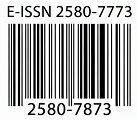Peradaban Infrastruktur Ibnu Khaldun
(Perspektif Perpindahan Ibu Kota Negara Republik Indonesia)
Abstract
Prophet Muhammad p.b.u.h., moved (hijrah) from Mecca al-Mukarramah to Medina al-Munawwarah, then founded the state of Medina by gathering the national strength of the Muslim, Christian and Jewish population with the identity of the Quraish, Auz, and Khazraj tribes. Caliph Ali bin Abi Talib moved the capital of the Rashidah Caliphate from Medina to Kufa, form Arab to the Persian region. Muawiyah bin Abu Sufyan chose Damascus as the capital of the Umayyah dynasty. Abu Abbas al-Safah placed the seat of the Abbasid dynasty in Baghdad. Furthermore, the Ottoman Empire had its capital in Istanbul. After turning into the Republic of Turkey, it occupies Ankara as the capital. Planning of moving the capital city of the Republic of Indonesia is from the Province of the Special Capital Region (DKI) Jakarta to the Province of East Kalimantan intended as an effort to equalize development that strengthen togetherness in a sense. The ideological, political, social, cultural and legal foundations serve as the basis of legitimacy in the historical footsteps of the Paser Kingdom and the Kutai Kartanegara Kingdom, as the center of government of the Republic of Indonesia. The theory of development ('umran), urban theory ('urban), and the theory of nationality ('asabiyah) put forward by Ibn Khaldun in the Muqaddimah have become methodological conceptions in studying maritime-based archipelago construction. This research shows the point of the new State Capital (IKN), in the archipelago network from Sabang to Merauke. A blueprint for the nation's journey that covers the dynamics of human resource potential in the natural resource management system of the republic of Indonesia.
References
Ali., A. Mukti, Ibnu Chaldun dan Asal Usul Sosiologi, (Yogyakarta : Yayasan Nida, 1997).
ibn Khaldun. Abd al-Rahman bin Muhammad, Muqaddimah Ibn Khaldun, (Beirut : al-Maktabah al-‘Ashriyyah, 2008).
--------------.Abd al-Rahman bin Muhammad, Muqaddimah Ibn Khaldun, Terjemahan Ahmadie Thoha, (Jakarta : Pustaka Firdaus, 1986).
Munawwir,Ahmad Warson., Kamus Al-Munawwir Arab – Indonesia Terlengkap, (Surabaya : Pustaka Progressif, 1997).
al-Haetsami, Al-Hadiz Nur al-Din ‘Ali bin Abi Bakr., Mawarid al-Dham’an Ilaa Zawaid Ibn Hibban, (Beirut : Dar al-Kutub al-Ilmiyyah, 2000).
Wafi, Ali Abdul Wahid, Ibnu Khaldun Riwayat dan Karyanya, (Jakarta : Grafiti Pers, 1985).
Al-Naisabury, Al-Imam Abu Bakar Muhammad bin Ibrahim bin Al-Munzir, Al Ausath fi Sunan wal Ijma’ wa al-Ikhtilaf, (Beirut : Dar al-Kutub al-‘Ilmiyah, 2000).
Biyanto, Teori Siklus Peradaban : Perpektif Ibnu Khaldun, (Surabaya : LPAM, 2004).
Lombard, Denys, Nusa Jawa : Silang Budaya, Jilid 2, (Jakarta : PT Gramedia Pustaka Utama, 2005).
Jabali, Fuad., Society, State, and Urbanisme: Ibn Khaldun’s Sosiological Thought, (New York : State Univesity of New York Press, 1988).
Imam Al-Qudha’iy, Musnad Asy-Syihab, (Beirut : Dar al-Kutub al-‘Ilmiyah, 2000).
J.M. Cowan (ed.), A Dictionary of Modern Written Arabic, (Ithaca New York : Spoken Language Service, 1976).
Mahdi, Muhsin., Ibn Khaldun’s Philosophy of History, (Chicago : The University of Chicago Press, 1971).
Sjadzali, Munawir., Islam dan Tata Negara, (Jakarta : UI Press, 1993).
Tim Ekspedisi Palu Koro, “Geologi di Tengah Gencarnya Pembangunan Infrastruktur oleh Pemerintah Jokowi”, dalam http://ekspedisipalukoro.id/2017/05/10/geologi-di-tengah/



_(1)1.png)















